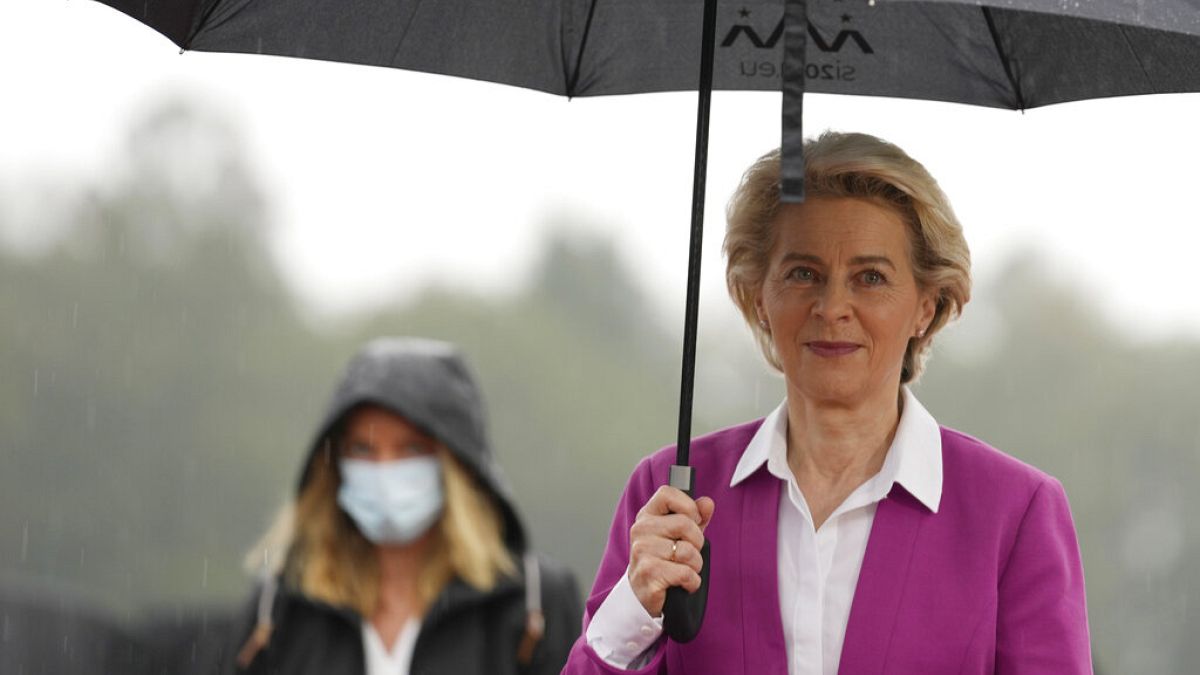As a summit is held on expanding EU membership to the Western Balkans, we look at where each country is with its bid to join.
The European Union is holding a summit on membership of the bloc for six nations in the Western Balkans.
Leaders are meeting in Slovenia amid widespread pessimism over the union being expanded to include Serbia, Kosovo, Albania, Montenegro, North Macedonia or Bosnia and Herzegovina.
Brussels is set to recommit to enlargement, but, so far, with no clear deadlines.
According to Croatia's former Foreign Affairs Minister, Vesna Pusic, recent flareups between Kosovo and Serbia have their roots in EU neglect.
"I've lived here my entire life here and the region has been in this state - unstable and fragile since the wars of the nineteen nineties," Pusic told Euronews. "Both segments of the political elites and societies have, to some extent, given up hope of ever being able to join the union."
Where do Western Balkan nations stand in their EU accession bids?
The six Western Balkan countries are at different stages, with Montenegro and Serbia having formally opened accession talks.
North Macedonia
North Macedonia applied for EU membership in 2004.
While it has fulfilled the criteria for beginning entry talks, EU member Bulgaria opposes North Macedonia's inclusion because of a dispute over language and national identity.
“We took all necessary steps and we made all required reforms. We’ll take the additional acceptable steps to unlock EU’s enlargement and we expect that Bulgaria will unlock this process,” North Macedonia Prime Minister Zoran Zaev.
But the government in Sofia, which wants North Macedonia to formally recognise that its language has Bulgarian roots, has not given any sign that it is ready to lift its veto. And other EU countries have not shown a strong appetite for speeding up the process.
Albania
Albania applied for EU membership in 2009 but despite meeting all the EU's demands, membership talks haven't started yet.
Since the Albanian and North Macedonian bids are linked and launching accession talks requires unanimous approval from all EU nations, Sofia's veto has also prevented Albania from moving forward.
“That actually is holding us hostage at a time where we have fulfilled all our tasks and wait to sit around the table with the European Union to kick off negotiations," said Albanian Prime Minister Edi Rama.
Montenegro
Montenegro applied for EU membership in 2008. Accession talks, which have begun in 2012, are advanced.
33 screened chapters have been opened, and three are provisionally closed. The biggest hurdles remain corruption, organised crime and the health of the economy.
EU Membership is so far scheduled for 2026 for the small Balkans nations.
Serbia
Serbia submitted its application for EU membership in 2009. Accession talks started in 2014 but lingering tensions between Serbia and Kosovo have held up the process.
“It is vital that Kosovo and Serbia normalise their relations,” said Ursula von der Leyen, president of the European Commission. “The EU-facilitated dialogue is the only platform to resolve the current crisis.”
Serbia, the largest of the Western Balkan nations, has been forging close ties with China and Russia despite warnings from the West about the two powers’ influence in the region.
Public interest in the membership has gradually dwindled in Serbia, and its leaders have very often sent mixed signals about their true EU commitment.
“All these years and even decades we have been listening about the membership promises from the EU,” said Serbian parliament speaker Ivica Dacic. “The question is which generation will see those promises being fulfilled. Why don’t they simply tell us, ‘we no longer want EU expansion,’ and we will accept it as a reality?”
Kosovo
Kosovo is a potential candidate for EU membership.
Five EU members — Cyprus, Greece, Romania, Slovakia and Spain — do not recognise Kosovo as a country.
"Kosovo’s future EU integration – like Serbia’s – remains closely linked to the EU-facilitated high-level dialogue between Kosovo and Serbia, which should lead to a legally binding comprehensive agreement on the normalisation of their relations," according to a European Parliament fact sheet.
Bosnia
Like Kosovo, Bosnia has been considered as a potential candidate for EU Membership since 2003.
The country has applied for EU membership in 2016.
But according to a European Parliament briefing note, "internal political instability and lack of political reforms have dampened the country's prospects of joining the EU."
_Watch the full interview with Euronews anchor Tokunbo Salako in the player above. _
What are the obstacles to EU membership?
Membership is dependent on improvements in democratic standards and socio-economic reforms, but despite making progress on these issues, the door to the EU seemingly remains closed.
"The greatest risk in the region is really a very steady and constant backsliding on the rule of law and the freedom of media," Majda Ruge from the European Council on Foreign Relations told Euronews. "You basically have issues of political meddling of key states in neighbouring states, specifically Serbia and Croatia."
The holdup in membership progress varies between each country. Bulgaria, for example, has vetoed North Macedonia talks over a language dispute.
Other EU countries remain generally cautious of new members, fearing a fresh wave of migration to Western member states.
In France, this is a particular concern for President Macron as he seeks election next year.
"The French elections play a very important role, of course, and one can understand that President Macron doesn't want anything that in any way will be a detrimental influence on his campaign and his chances to win another term," Pusic said.
As membership talks stall, other nations such as China and Russia have been quick to provide investments and exert influence on countries in the region.
The EU has so far offered more finance to the Western Balkans, but divisions between members mean that enlargement seems off the menu for now.
